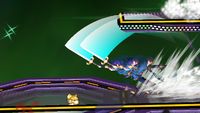| Welcome to SmashWiki! Log in or create an account and join the community, and don't forget to read this first! |
| Notices |
|---|
| The Skill parameter has been removed from Smasher infoboxes, and in its place are the new "Best historical ranking" and "Best tournament result" parameters. SmashWiki needs help adding these new parameters to Smasher infoboxes, refer to the guidelines here for what should be included in these new parameters. |
| When adding results to Smasher pages, include each tournament's entrant number in addition to the player's placement, and use the {{Trn}} template with the matching game specified. Please also fix old results on Smasher pages that do not abide to this standard. Refer to our Smasher article guidelines to see how results tables should be formatted. |
| Check out our project page for ongoing projects that SmashWiki needs help with. |
Small step forward smash: Difference between revisions
Luigifan18 (talk | contribs) m (Formatting fix) |
m (Text replacement - "|thumb|right" to "|thumb") |
||
| (8 intermediate revisions by 6 users not shown) | |||
| Line 1: | Line 1: | ||
{{ArticleIcons|ssb=y|ssbm=y|ssbb=y}} | {{ArticleIcons|ssb=y|ssbm=y|ssbb=y|ssb4=y|ssbu=y}} | ||
[[File:Small_step_fsmash_cr.png|thumb | [[File:Small_step_fsmash_cr.png|thumb|A demonstration of the small step forward smash in ''Melee''. Left: small step f-smash, right: standing f-smash]] | ||
The '''small step forward smash''' is a technique that effectively extends the range of a [[forward smash]] by intentionally delaying a few frames between the [[control stick]] tap and the attack button press. As the game allows a specific window of time between the two inputs (3 frames in ''Melee' | The '''small step forward smash''' is a technique in all ''Smash'' games that effectively extends the range of a [[forward smash]] by intentionally delaying a few frames between the [[control stick]] tap and the attack button press. As the game allows a specific window of time between the two inputs (3 frames in ''Melee'') in order to differentiate the combination from a [[dash attack]], this causes the character to dash forwards slightly before the forward smash begins, therefore increasing its range based on how far the character moves in their early dashing animation. This can also be used to intentionally decrease the range of a forward smash for small positioning advantages. | ||
In ''Melee'', there is only 1 frame available to delay instead of 3 when doing a forward smash in the opposite direction, making it pointless. | In ''[[Melee]]'', there is only 1 frame available to delay instead of 3 when doing a forward smash in the opposite direction, making it pointless. On the other hand, in ''[[Smash 4]]'', the player can choose when to forward smash in the opposite direction. In ''[[Ultimate]]'', the window is 5 frames for both directions. | ||
The small step forward smash is most useful for characters whose forward smash has low startup and high range (such as Marth), effectively increasing the range slightly further. [[Pivoting]] can be used in a similar, yet more universal way, but it | The small step forward smash is most useful for characters whose forward smash has low startup and high range (such as Marth), effectively increasing the range slightly further. [[Pivoting]] can be used in a similar, yet more universal way, but it is much harder to do and also takes one frame longer. | ||
[[Category:Techniques (SSB)]] | |||
[[Category:Techniques (SSBM)]] | [[Category:Techniques (SSBM)]] | ||
[[Category:Techniques (SSBB)]] | [[Category:Techniques (SSBB)]] | ||
[[Category:Techniques ( | [[Category:Techniques (SSB4)]] | ||
[[Category:Advanced | [[Category:Techniques (SSBU)]] | ||
[[Category:Advanced techniques]] | |||
Latest revision as of 09:49, April 12, 2023
The small step forward smash is a technique in all Smash games that effectively extends the range of a forward smash by intentionally delaying a few frames between the control stick tap and the attack button press. As the game allows a specific window of time between the two inputs (3 frames in Melee) in order to differentiate the combination from a dash attack, this causes the character to dash forwards slightly before the forward smash begins, therefore increasing its range based on how far the character moves in their early dashing animation. This can also be used to intentionally decrease the range of a forward smash for small positioning advantages.
In Melee, there is only 1 frame available to delay instead of 3 when doing a forward smash in the opposite direction, making it pointless. On the other hand, in Smash 4, the player can choose when to forward smash in the opposite direction. In Ultimate, the window is 5 frames for both directions.
The small step forward smash is most useful for characters whose forward smash has low startup and high range (such as Marth), effectively increasing the range slightly further. Pivoting can be used in a similar, yet more universal way, but it is much harder to do and also takes one frame longer.

